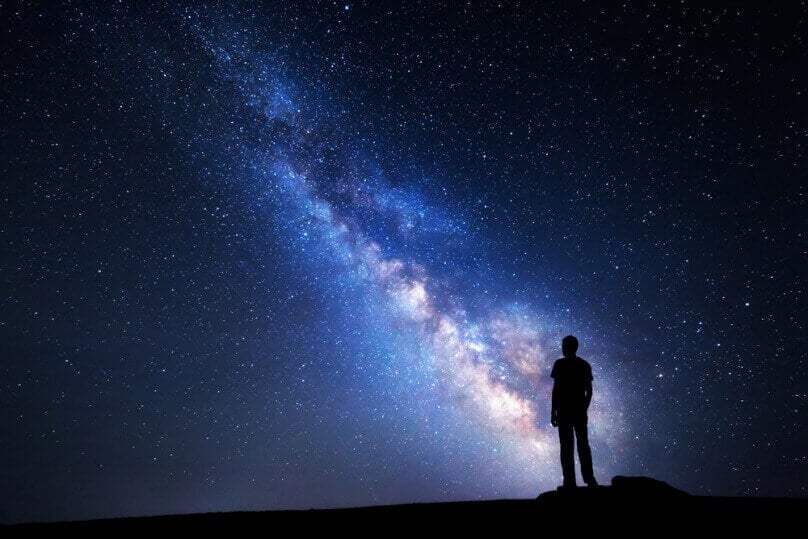
Not long ago, our hemisphere passed through the Perseid meteor shower. When I was young, my family was heavily into astronomy. We owned more than one telescope, and we would sometimes all pile into the van after dark and drive out to the countryside, where there were no streetlights or house lights, but only the velvety darkness and the sound and smell of sleeping cows.
On this road, you could look up and see the Milky Way spread out across the top of the sky like a shining river. The planets gleamed like jewels, red and yellow and blue. More than once I actually heard a meteor sizzle past like a drop of water on hot soapstone.
Having had these almost mystical experiences throughout my childhood, I feel very strongly — perhaps too strongly — that astronomy ought to be part of every childhood. But in this, I have largely failed with my own kids. We’re just too busy. We’ve prioritised other things, and the thought of dragging ourselves outside in the dark for one last outing at the end of an exhausting day is unbearable.
So my kids know a few constellations. We’ve dabbled in homemade sundials, and they understand the seasons and eclipses and why astrology is nonsense. But a love of astronomy is not part of our family identity, the way it was for my family of origin.
I know this, and I know that knowing it sometimes cause me disproportionate distress. And this is why, when I prepared to take my kids out for the annual Perseid meter shower, I gave myself more than one stern lecture.
The Perseids are an ideal meteor shower, where we are. You can see plenty of shooting stars near the zenith, so the numerous mountains and trees don’t block our view. You don’t have to stay up past midnight to get a good show; the weather is almost always pleasant; and it comes toward the end of our summer vacation, making a much-needed consolation prize before school starts again.
So even though we’re not That Astronomy Family, we always go out and see the Perseids. This year, we made the effort to drive into the country, away from artificial lights.
I did a certain amount of managing expectations. This is something I try to do whenever I introduce the kids to a new activity that may or may not be thrilling and meaningful. I’m not trying to turn them into pessimists; I’m just trying to teach them to adjust their hopes to reasonable levels, so they can enjoy what they have, rather than feeling perpetually dissatisfied.
Part of our job as parents is to get kids used to the idea that it’s possible to be happy, or at least at peace, even when every little experience doesn’t hit maximum fun or excitement. And then sometimes, life exceeds our expectations, and we receive it as an extra gift, rather than as our due.
So I told them that we’d almost certainly see some meteors, maybe a lot, maybe a few, and that they might be bright or dim, depending on how clear the sky was. I told them that they would likely see a flash and perhaps a short streak, but that there wouldn’t be any fireballs screaming madly around the sky. We talked a bit about what it is we’re seeing when we see a meteor, and why we’re seeing it now. Just putting things into perspective.
And more importantly, I gave myself a private little lecture. Now listen, I said to myself.
They might love it, or they might not care very much. You are doing this because you want them to have the chance to see something interesting and beautiful, but there are many other interesting and beautiful things in the world, so this isn’t an all-or-nothing night.
It has been a long day, and some of these kids are pretty tired. Some are afraid of the dark, and may act out to hide the fact. Some may be impressed, but are currently too cool to show it. How much they enjoy it, or appear to enjoy it, is not the final word on my worth as a mother providing a well-rounded life for my children. And for goodness’ sake, it might be cloudy.

And guess what? It was cloudy. The Perseids this year were kind of a bust. Everyone saw at least a few meteors, though, and a few of us saw some real dazzlers. The kids who insisted on lying on their stomachs and snarking at each other missed them, so ha ha to them. They’ll know to look next time. And we had a nice time.
I’m telling you this because it wasn’t too many years ago that, under the exact same circumstances, I would have behaved abominably. I would have let my expectations leap far beyond what is reasonable, and tried to recreate out of whole cloth some idealised version of my own childhood; and then I would have been crushed and bitter when it inevitably didn’t come together.
I would, in short, have ruined everything for everybody, just because I pinned all my hopes, and a lot of my self-worth, on getting something really good.
As it is, I think I did a pretty decent job of hiding my mild disappointment. The kids had a pleasant evening, something out of the ordinary, and it may even have sparked an interest in astronomy in a few of them. Or not. At least we had a family outing that didn’t end in tears. We got some fresh air. We lay down in the grass side by side. We enjoyed each other’s company, more or less. And we did look up at the stars for once, side by side.
The truth is, kids respond to and mimic their parents’ attitudes far more than we like to admit. They are looking to us all the time, for better or for worse, to find out what life is like and how to respond to the good, the bad, the disappointing, and the surprising.
My own childish wonder and awe at the Jupiter and Saturn so many years ago probably came partly from the spectacle itself, but also from my parents’ delight in it.
And that’s what I really want to pass down to my kids, more than a love of astronomy: A sense of delight in something bigger than myself.
And it’s all right if astronomy isn’t what delivers that for our family. So if I want a good experience with the family, it’s true that it’s important to manage the kids’ expectations so they’re not let down. But it’s probably even more important to manage my own.
To recognise what my true motivations are, to assess what is reasonable to achieve, and to ready myself to behave in a way that won’t cause me regret.
And goodness, next year it may not be so cloudy. We can always hope.

